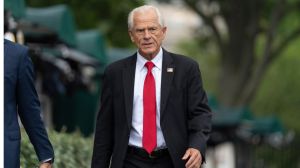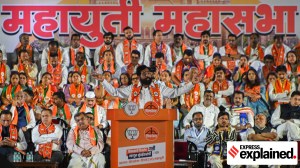Small state, big dreams
IF there8217;s something Okram Iboboi Singh has learnt ever since he became Manipur8217;s chief minister, it is the art of accommodation. ...

IF there8217;s something Okram Iboboi Singh has learnt ever since he became Manipur8217;s chief minister, it is the art of accommodation. His Cabinet is bursting at the seams with members of the Secular Progressive Front SPF, which assumed power in the first week of March. A state that was government-less for months now has 18 cabinet ministers, including the CM, 10 ministers of state with independent charge and five ministers of state. In fact, the pressure on Ibobi Singh to make place for every member of the ruling front didn8217;t leave behind anybody for the post of deputy speaker! Though Singh appointed Congress8217;s Kangujam Ranjit Singh as deputy speaker on March 21, he resigned the very next day after letting the CM know that all he wanted was a cabinet berth. The post was eventually bagged by the opposition. That leaves only two legislators in the ruling front without a portfolio. Ibobi has still managed to cling to the home, finance, cabinet, personnel and administrative reforms portfolios, as perhaps, future IOUs. For a small state, Manipur8217;s politicians sure have big ambitions. Now if only their ambition would translate into performance.
Hope floats at Majuli
MAJULI, the world8217;s largest river island that can be found in Assam, now has a buffer of protection against the Brahmaputra8217;s fury. Unesco has provided 20,000 as assistance to the Majuli Island Protection and Development Committee to prepare a dossier that would help push forward the island8217;s case for recognition as a world heritage site. Majuli, also the centre for Satriya art and culture initiated by Sankaradeva, the 16th century Assamese reformer-saint, has been battling the mighty Brahmaputra for over five decades now, losing 600 sq km of area in the process.
COCO, Arunachal8217;s POTA
ALL8217;S not well, it appears, in the Land of the Dawnlit Mountains. Why else would Arunachal Pradesh feel the need to have its own version of POTA? Its avatar has an even more lyrical name: Arunachal Pradesh Control of Organized Crimes Ordinance, 2002, or COCO. The ordinance has been approved by the state cabinet and is awaiting the governor8217;s assent.
Highway taxmen
NATIONAL highways 39 and 53, which pass through Manipur, are much feared stretches since they go through militant zones. While the government provides protection only to vehicles that transport petroleum products to the state, private vehicles must cross their fingers and fend for themselves. Chief minister Okram Ibobi Singh admits that private vehicle owners have reached a deal with militant groups by paying a 8216;goods tax8217; and 8216;road tax8217;. The ripples are felt in Manipur8217;s markets, where onions cost Rs 10 per kg compared to Rs three in Assam. But there8217;s competition: organised gangs of highway robbers are also yanking out their knives to stake their claim. Ibobi Singh has taken his plaint to the Centre.
- 01
- 02
- 03
- 04
- 05































